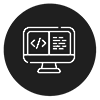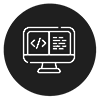E4 UI Testing: A Paradigm Shift
Testing user interfaces (UI) is always a challenging task, commonly relegated to the last phases of application development and hurriedly executed. However, it is now possible to overcome this challenge by developing UI plugins using the E4 POJOs (seamlessly integrating with existing Eclipse 3 plugins). The E4 architecture enables us to liberate ourselves from dependencies on high level Eclipse RCP stacks, unlocking new opportunities for testing UI POJOs together directly during the integration test phase.




